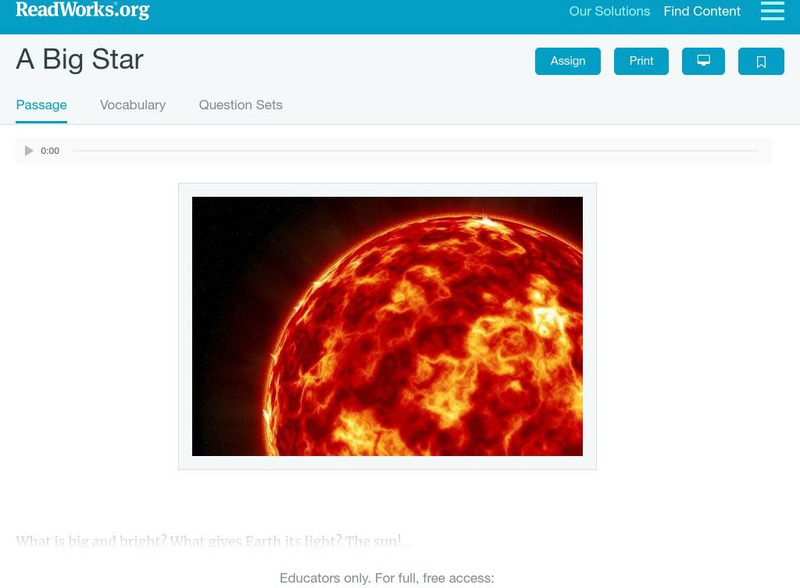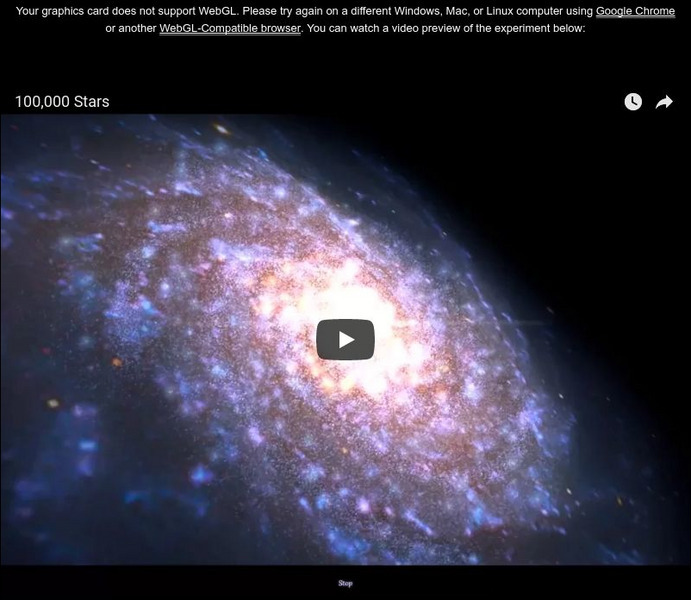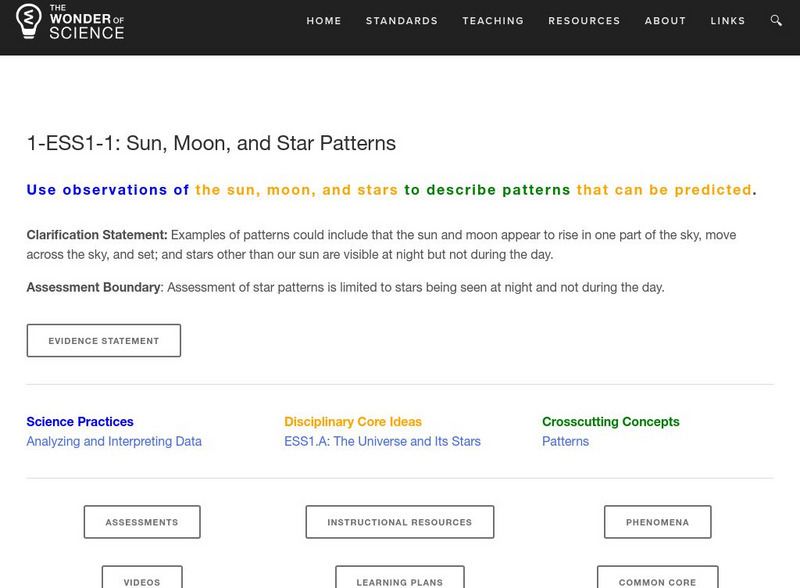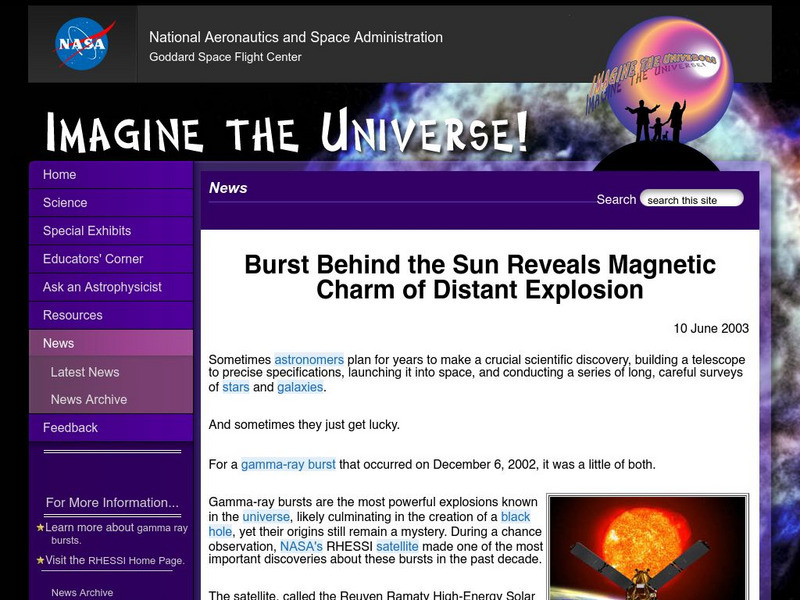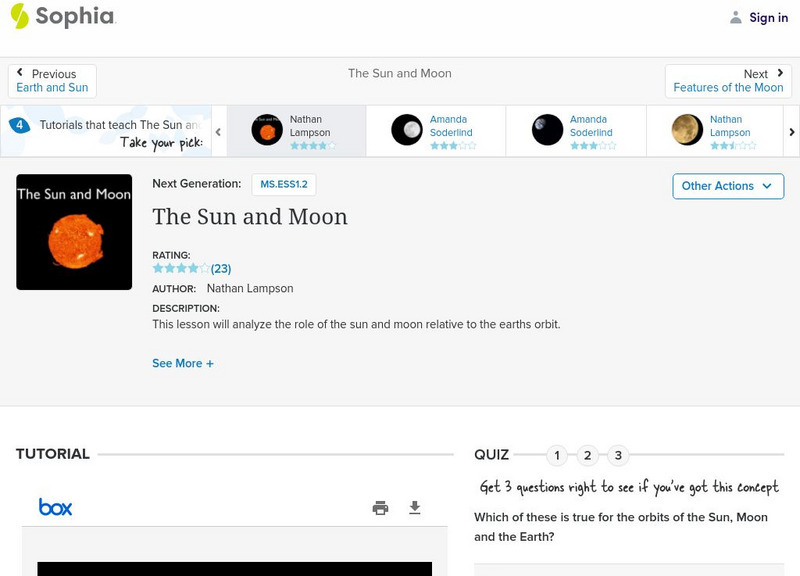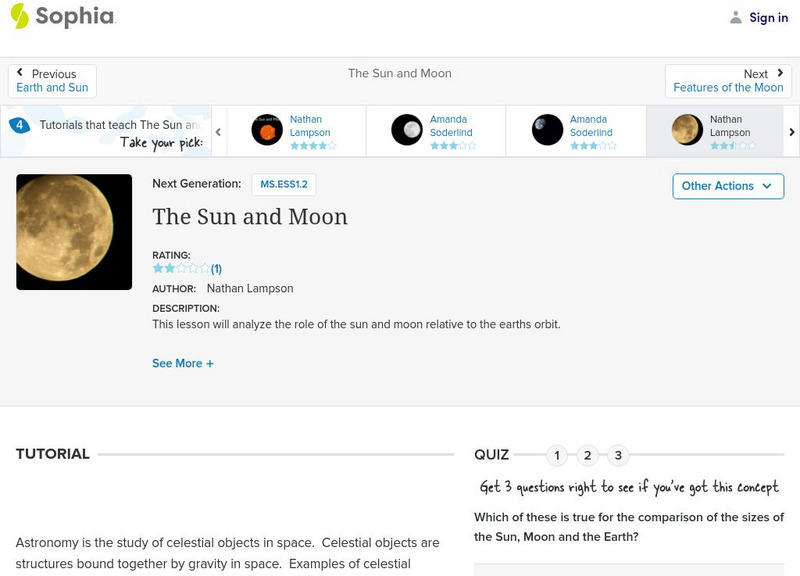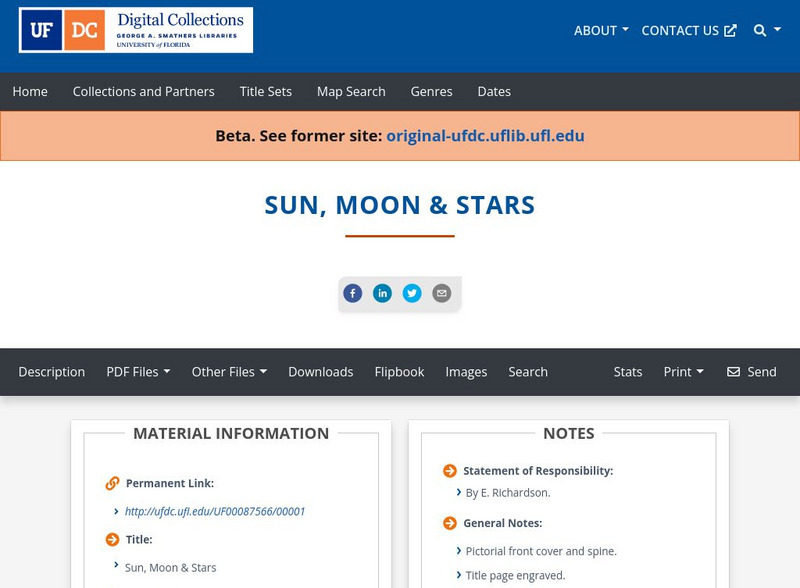NASA
Nasa Star Child: Stars
This page details the life cycle of a star, and includes information on medium-sized and massive stars, plus a glossary and a question.
NASA
Nasa: The Sun
An introduction to the Sun including its size and distance from the Earth, sunspots, flares and coronal mass ejections.
NASA
Nasa Star Child: The Sun
Get to know our nearest star with this introduction to the sun. Listen to the information in an audio file. Vocabulary words are linked to a glossary of terms. Features include links to other interesting facts and a printable version of...
Read Works
Read Works: A Big Star
[Free Registration/Login Required] This reading passage is about the sun including what it is and what it does for the earth. It if followed by reading comprehension questions based on Common Core standards.
Other
Chrome Experiments: 100,000 Stars
Zoom in and out to explore our galaxy in this interactive 3D visualization of the stellar neighborhood, including over 100,000 nearby stars.
American Museum of Natural History
American Museum of Natural History: Ology: What Do You Know About Stars?
Test your knowledge with this ten-question quiz on stars. Focusing on stars in the Milky Way galaxy, questions range from the life cycle of a star to the number of stars in our galaxy.
The Wonder of Science
The Wonder of Science: 1 Ess1 1: Sun, Moon, and Star Patterns
The NSTA vetted source includes resources to help students describe patterns of the sun, moon, and stars using observation. Included are assessment ideas, videos, examples, lesson plans, and photos of student work.
NASA
Nasa: Imagine the Universe: "Burst Behind the Sun"
Site provides the article, "Burst Behind the Sun Reveals Magnetic Charm of Distant Explosion," that details on a gamma-ray burst that occurred on December 6, 2002. Provides graphics and links to learn more about gamma-ray bursts.
CK-12 Foundation
Ck 12: Fifth Grade Science: Earth Science: Stars
Investigate what constellations are and how to use light-years as a unit of distance in this module. Learn how to measure star distances in creative ways.
Nine Planets
The Eight Planets: The Sun Solar Wind
This Eight Planets site briefly describes solar wind, a low density stream of charged particles emitted by the Sun. It also provides the basics on the sun's composition and additional sun links.
PBS
Pbs Learning Media: Sky Patterns: Sun, Moon, and Stars
Observe the regular, predictable patterns of the Sun, Moon, and stars in the sky in this media gallery from WGBH. Interact with the animated storybook to observe and predict patterns of the Sun, Moon, and stars over a day and analyze...
PBS
Pbs Learning Media: Sun, Moon, and Star Patterns in the Sky: Lesson Plan
Observe how the Sun, Moon, and stars are visible in the sky at different times of the day and identify predictable patterns in the apparent motion of these objects with this WGBH lesson plan. Students record and analyze data to identify...
Wonderville Media
Wonderville: The Stars
Our sun is a star. It is about 93,000,000 miles away, but in space, that distance is nothing. It makes the sun seem like our next-door neighbor! The next closest star is almost a million times farther away. Learn about The Stars in this...
Other
University of Leicester: Sun
Provides a brief overview of the Sun, including a focus on solar eclipses, solar wind, and solar sailing.
University Corporation for Atmospheric Research
Ucar: The Sun
Learn about the sun, the center of our solar system and the closest star to Earth.
Sophia Learning
Sophia: The Sun and Moon
An expertly illustrated presentation which highlights the sun and moon, and their relationship to the Earth.
Nine Planets
The Nine Planets: Sun Picture List
Various pictures and movies of the sun. Download some of these files and then give a presentation to your class explaining the solar phenomena.
Sophia Learning
Sophia: The Sun and Moon: Lesson 3
This lesson will analyze the role of the sun and moon relative to the earth's orbit. It is 3 of 4 in the series titled "The Sun and Moon."
Sophia Learning
Sophia: The Sun and Moon: Lesson 4
This lesson will analyze the role of the sun and moon relative to the earth's orbit. It is 4 of 4 in the series titled "The Sun and Moon."
Ducksters
Ducksters: Astronomy for Kids: Stars
Kid's learn about the science of stars like our Sun. Giant hot balls of gas and energy made mostly of hydrogen and helium.
University of Florida
Baldwin Library: Sun, Moon and Stars
A scanned copy of the 1899 publication of Sun, Moon and Stars by E. Richardson, a book of children's poetry.
Exploratorium
Exploratorium: Science Snacks: Reflections of a Star
This simple lesson allows students to work cooperatively in determining the angular diameter of the Sun.
PBS
Pbs News Hour Extra: Satellites Orbit the Sun to Better Predict Solar Storms
For the first time, NASA scientists have generated a full image of the sun, front and back, using twin orbiting satellites. The new view of Earth's star will allow for the study of solar weather events like coronal mass ejections that...
Science Education Resource Center at Carleton College
Serc: Calculating the Declination of the Sun for Elementary Students
In the school courtyard, young scholars will measure the apparent path of the sun across the sky using a toilet plunger. Students will then generate questions as to why the sun appears to move, and what is really happening in the...
Other popular searches
- Sun and Stars
- Sun and Stars Diagram
- The Sun and Stars
- Sun Moon Stars
- Moon, Sun and Stars
- Sun and Stars Powerpoint
- Moon Sun and Stars
- Sun and Stars Webquest
- Sun and Stars Web Quest
- Sun, Moon, Stars
- Sunflower Stars
- Sun, Moon and Stars





